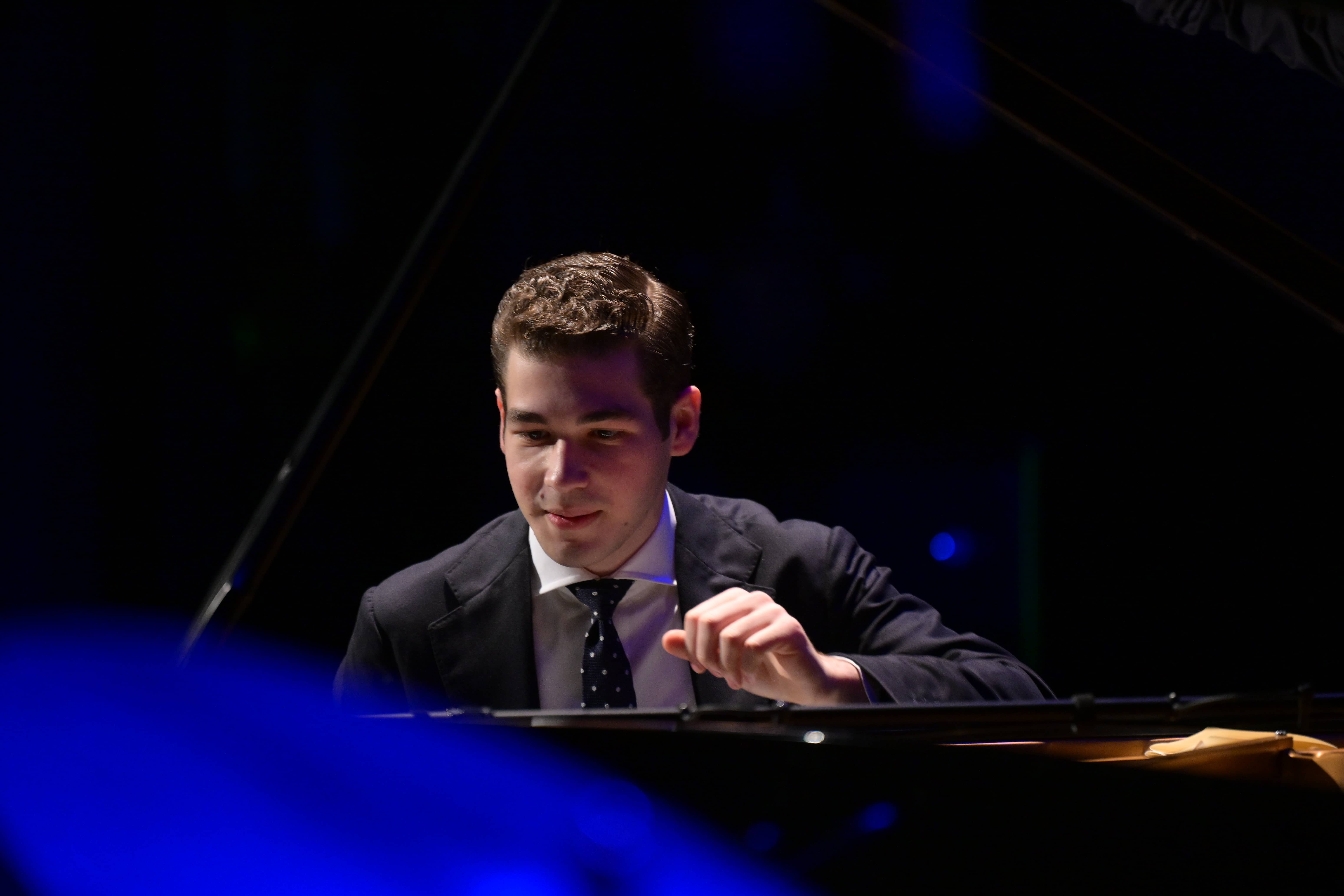

Brandon Goldberg is a rising star in the world of jazz. Although just finishing his freshman year at Julliard, Brandon has already released three albums, performed at leading jazz clubs such as Dizzy’s and Mezzrow in New York City, and has been featured at jazz festivals around the country.
Goldberg demonstrated the full range of his still-evolving talents during his performance on April 27 as part of the 2024-25 season of the Miami International Piano Festival. As both a soloist and fronting a trio, his remarkable technique, harmonic imagination and a never-flagging sense of swing created an afternoon of truly great and original music.
Brandon played solo for the first half of the program, revisiting a format he first attempted at an MIPF concert 3 years ago. While the previous performance showcased the songs of George Gershwin, Cole Porter, and Irving Berlin, this time he kept Gershwin and Porter, but replaced Berlin with Jerome Kern and a selection from the great bebop pianist Bud Powell.
As I noted in my review from 3 years ago, Brandon approaches solo playing with an arranger’s sensibility. Each tune is given a unique setting, whether the hymn-like introduction and hypnotic motion of “When Smoke Gets in Your Eyes,” the bluesy stride of “They Can’t Take that Away From Me,” or creating counterpoint lines for “Embraceable You.” And he tipped his hat to the great Capitol-era recordings of Frank Sinatra by borrowing Nelson Riddle’s motif on “What Is This Thing Called Love?”
The Gershwin/Porter overlap meant that Goldberg played a few of the same songs at both concerts, which provided a direct opportunity to observe his growth as an artist. I’m pleased to report that he’s basically the same musician. His voice and style remain, in essence, unchanged, but refined. His already impressive touch is even better – he can play with the subtly of Bill Charlap, and even when playing slow or softly, notes are well-articulated, never mushy or ill-defined. And although each tune was improvised, every number had an overall compositional sense…a complete story told in 4 or 5 minutes.
While the choice of material, harmonies and rhythms of the first set were clearly rooted in jazz, Brandon played most of the tunes at tempos that could be described as “contemplative,” “meditative” or “lilting” which gave the proceedings the feeling of a classical recital. For the second set, Goldberg was joined by 2 accomplished New York musicians, Vincent Dupont on bass and Aaron Kimmel on drums, and the vibe shifted from concert hall to jazz club.
The trio kicked things off with Bud Powell’s lightning fast romp “Wail” which proved that Brandon’s crisp attack survives even at high speed and featured a short, clean solo drum solo from Kimmel.
Even in the trio setting, Brandon retains his arranger’s sense: Kern’s “Dearly Beloved” morphed into Kern’s “I Won’t Dance” before returning to the original tune; Porter’s “Every Time We Say Goodbye” made use of his “All of You” as an introduction (and featured a beautiful, singing bass solo by Dupont); and Gershwin’s “It Ain’t Necessarily So” went from it’s usual bluesy lope into a double time stride episode that quoted “Rhapsody in Blue.”
Of all the incredible attributes of Brandon’s playing, there are two I always come back to. First is his musicality. Unlike many gifted young players (and some older ones, but this is mostly an affliction of youth), Brandon never plays something just to show off his technique. His technical skill is always deployed in the service of making great and enjoyable music. So, no 20 minute solos and no jaw-dropping displays of speed and dexterity that don’t swing or lack feeling. Second is the sheer, infectious joy he radiates when performing. You don’t have to know anything about The Great American Songbook or who Art Tatum was to be carried away by Brandon’s playing.
And so, perhaps my favorite song of the concert was the most unadorned in terms of arrangement, technique or “wow” factor…just a simple, straight-ahead performance of Kern’s “Long Ago and Far Away”, played at an easy swing tempo, with Brandon and the rhythm section in perfect synch.





